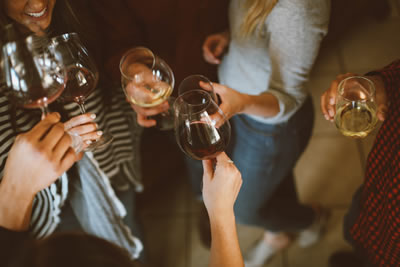How Much Does Alcohol Hinder Weight Loss?

How much do the calories in alcohol affect your weight loss? Does a few drinks each night or weekend really make that much difference?
Alcohol is the most social and common kind of "drug" we can take, and it's a normal part of our society and socialising to have a few drinks. We've been drinking alcohol for centuries from simple fermented drinks to classy wines, champagnes, and exotic cocktails. There are obvious health and social problems associated with excessive or binge consumption of alcohol, but what about it's effects on people aiming for weight loss?
Calories in Alcohol
Just like any food or drink you consume (except water) alcoholic drinks contain energy or calories. There are 7 calories per gram of alcohol (29kJ), second only to fat (9 calories per gram) in energy concentration. A standard alcoholic drink contains 8 grams of alcohol, which is equal to 56 calories from the alcohol alone (not to mention sugars that are also sometimes present).
The other downside of alcohol is that a standard drink isn't so standard anymore! One pint of beer has 2.5 units of alcohol, a 125ml glass of wine (this is a small glass!) has 1.5 units, and a nip of spirits is 1 unit. The original guidelines for standard drink sizes have become outdated as we serve stronger beer (5% not 3%), stronger wine (13% not 10%) and larger portions of all drinks eg double shots are standard in most pubs. So you can see that a standard drink contains a significant amount of calories from alcohol - and that's not including the calories from mixers sugar in the alcoholic drink and then any mixers you have!
Effects on Weight Loss
So all alcoholic drinks contain a significant amount of calories per serve, and we often have a lot more than just one serve! But how much damage does this do for your weight loss efforts? You can easily see that 1-2 drinks per day can add a significant amount of empty calories to your weekly total.
Burning off just one beer or glass of wine can take 30 minutes of walking or about 12 minutes of running! So you can see there's a lot of work to be done if you have a few drinks. Think of all the blood, sweat, tears, and hard work that can go into a great fitness session....and how easily it can be reversed by drinking alcohol. Also, alcohol contains no essential nutrients and reduces the absorption of Vitamins A, D, E, K, folate, B I, and B2. As well, alcohol does not contribute to muscle glycogen, so you may be left short on carbohydrates, which you need in order to train hard.
What about the calories in low carb beer?
Low carb beer has become more popular recently but how much difference does it really make?
Let's take Pure Blonde as an example. This is a full strength, low-carb beer (4.6 %). It contains 0.9 grams of carbohydrates per 100mL - a significant reduction to a standard full strength beer that on average contains around 20% more energy (usually 3g / 100mL). So you definitely save some energy intake by going low carb - approximately 25 calories per drink - but this really isn't much.
The energy in beer and other drinks is from the alcohol.
You're much better off going for light beers as the energy saved from the reduced alcohol content far outweighs the low carb idea. As stated earlier, most of the calories in alcoholic drinks comes from the alcohol at 7 calories per ml, not sugar or carbs.

